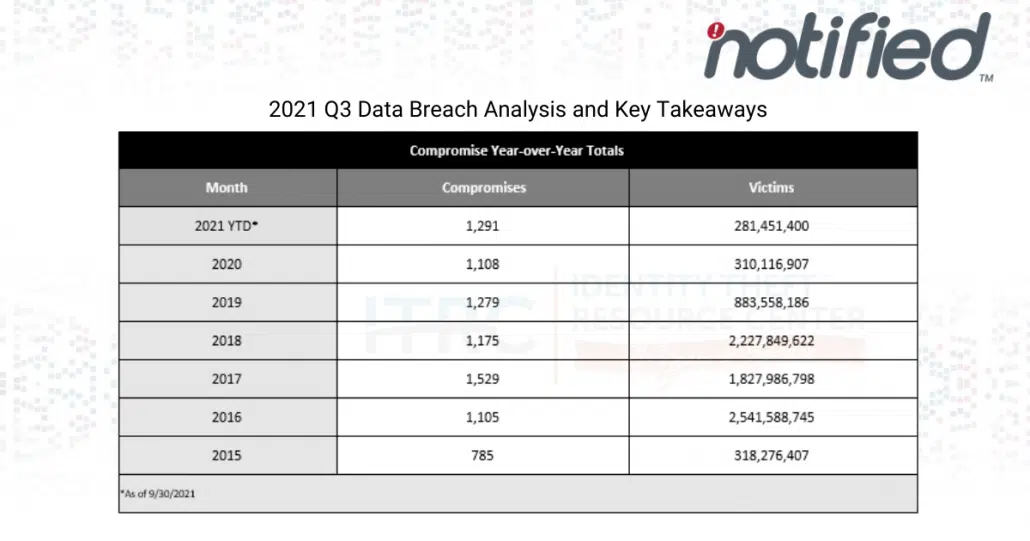Number of Data Breaches in 2021 Surpasses All of 2020
Home Help Center Number of Data Breaches in 2021 Surpasses All of 2020

The number of data breach victims dramatically increased in Q3 2021 due to a series of data exposures during the quarter
SAN DIEGO, October 6, 2021 – Today, the Identity Theft Resource Center® (ITRC), a nationally recognized nonprofit organization established to support victims of identity crime, released its U.S. data breach findings for the third quarter (Q3) of 2021. According to the data breach analysis, the number of data breaches publicly-reported in the U.S. decreased nine (9) percent in Q3 2021 (446 breaches) compared to Q2 2021 (491 breaches). However, the number of data breaches through September 30, 2021 has exceeded the total number of events in Full-Year (FY) 2020 by 17 percent (1,291 breaches in 2021 compared to 1,108 breaches in 2020). The trendline continues to point to a record-breaking year for data compromises (the all-time high of 1,529 breaches was set in 2017).
For Q3 2021, the number of data compromise victims (160 million) is higher than Q1 and Q2 2021 combined (121 million). The dramatic rise in victims is primarily due to a series of unsecured cloud databases, not data breaches. Also, the total number of cyberattack-related data compromises year-to-date (YTD) is up 27 percent compared to FY 2020. Phishing and Ransomware continue to be, far and away, the primary attack vectors.
Download the ITRC’s 2021 Q3 Data Breach Analysis and Key Takeaways
“While the total number of data breaches dropped slightly in Q3, we are only 238 data breaches away from tying the all-time record for data compromises in a single year,” said Eva Velasquez, President and CEO of the Identity Theft Resource Center. “It’s also interesting to note that the 1,111 data breaches from cyberattacks so far this year exceeds the total number of data compromises from all causes in 2020. Everyone needs to continue to practice good cyber-hygiene to protect themselves and their loved ones as these crimes continue to increase.”
Other findings in the analysis include:
- There have been no publicly-reported data breaches to date in 2021 attributed to payment card skimming services.
- Some organizations and state agencies are not including specifics about data compromises or reporting them on a timely basis. One state has not posted a data breach notice since September 2020.
Enhancing Data Security – U.S. Senate Committee Hearing – Oct. 6, 2021
The ITRC will testify before the U.S. Senate Committee on Commerce, Science & Transportation today to present the findings from our Q3 Data Breach Analysis. Watch the hearing on enhancing data security live at 10 a.m. EST/7 a.m. PST. ITRC COO, James E. Lee, issued a written statement for the record as part of a hearing with the U.S. Senate Committee.
For more information about recent data breaches, or the increase in the number of data breaches discussed in the latest trend analysis, consumers and businesses should visit the ITRC’s data breach tracking tool, notified.
Anyone can receive free support and guidance from a knowledgeable live-advisor by calling 888.400.5530 or visiting www.idtheftcenter.org to live-chat.
About the Identity Theft Resource Center
Founded in 1999, the Identity Theft Resource Center® (ITRC) is a national nonprofit organization established to empower and guide consumers, victims, business and government to minimize risk and mitigate the impact of identity compromise and crime. Through public and private support, the ITRC provides no-cost victim assistance and consumer education through its website live-chat idtheftcenter.org and toll-free phone number 888.400.5530. The ITRC also equips consumers and businesses with information about recent data breaches through its data breach tracking tool, notified. The ITRC offers help to specific populations, including the deaf/hard of hearing and blind/low vision communities.
Media Contact
Identity Theft Resource Center
Alex Achten
Head of Earned & Owned Media Relations
888.400.5530 Ext. 3611
[email protected]
How much information are you putting out there? It’s probably too much. To help you stop sharing Too Much Information, sign up for the In the Loop.
Get ID Theft News
Stay informed with alerts, newsletters, and notifications from the Identity Theft Resource Center

